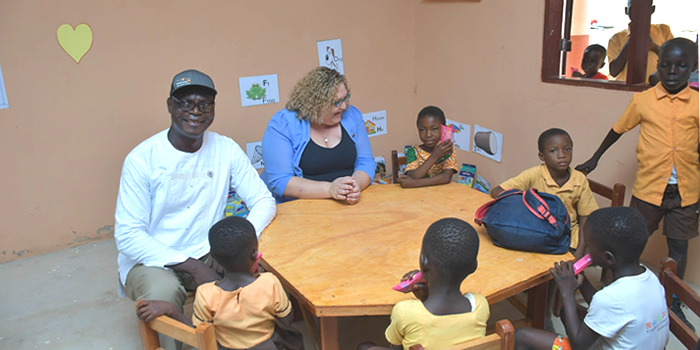Adverts
EDUCATION
Aniantetem benefits from World Vision and Australian High Commission
Many children at Aniantetem in the Upper Denkyira West District of the Central Region have missed school enrollment age due to lack of access to school.

Date Created : 7/22/2022 12:00:00 AM : Story Author : Nana Yaw Gyimah/ Ghanadistricts
Children of school-going age have to walk for about 8 kilometres to the nearest community, Dankwakrom, in order to access education. Many parents for this reason fail to get their wards at age four, the right age for enrollment.
According to a 2020 Multiple Indicator Cluster Survey, less than 7 percent of primary school-age children in Ghana are out of school, translating to some 400,000 children in total. Some pupils are also not punctual in school due to the distance covered daily. One of the reasons identified for the high figures recorded is the lack of school infrastructure.
Studies have shown Right Age Enrollment helps in early detection of learning difficulties in some children to enable them receive appropriate support. As an intervention, World Vision Ghana, through the support of the District Aid Programme of the Australian High Commission in Ghana, has constructed a three-unit classroom block at Aniantetem.
The building is to provide a decent and accessible educational facility for the kindergarten and lower primary pupils. Speaking at the commissioning of the school block, the National Director of WVG, Dickens Thunde, said World Vision sees education as a means of achieving a world of peace, justice, freedom, and equality for all.
“The organisation is a child-focused one with the primary objective of protecting the rights of children and providing quality health care, quality education, water and sanitation and hygiene and livelihood security,” he said. 
For the past nine years, the organization has invested close to $1.5 million in projects in the area, including school infrastructure, training of teachers and provision of teaching, learning and recreational materials, as well as water and sanitation facilities for schools.
“The impact of these interventions include improvement in school enrolment, Improvement in reading among early grade learners, and increased learning opportunities for children after regular school time,” Mr. Thunde said.
Through World Vision, the community started a self-help project to put up a school close to the community and solicited support from the Australian High Commission to complete the project.
The Upper Denkyira West District Director of Education, Frank Kow Hayford, also commended the Australian High Commission for the support and the WVG for leading the way to secure funding for the school project. 
He said the school block would not only improve school enrolment but bring education to the doorsteps of the community as they would not have to walk long distances just to access education.
Mr. Hayford is optimistic of a reduction in truancy and encourages more parents to send their children to school at the right age.“The school would also save the health of the children as they would not have to make the long journey daily which he said was affecting their health,” he added.
The representative of the Australian High Commissioner, Harry Williams, said Australia considered education as one of the pillars of societal growth, and hence did not hesitate to fund the project.
She said the school project would give the children a good foundation to enable them to discover their potential.
The project would be beneficial to the children of Aniantentem but adjoining communities.

